Desert Magic
As Dubai, in the United Arab Emirates, opens up to tourism, visitors are discovering there is much more to this desert nation than oil and sand.
By Ron Gluckman/Dubai, UAE
THE TRUCK TIRES SPIN FRANTICALLY, kicking up clouds of road dirt. Suddenly, at the crest of a hill, the wheels catch upon a cluster of rocks, propelling the truck forward. At the same moment, the road drops drastically, leaving us airborne for a few frightening seconds.
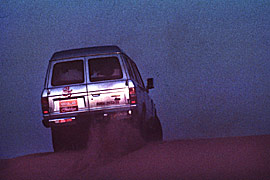 KEEEOUGHLUNK! First the front tires crash. BUNKAAABUURROOM, goes the rear
end, in a painful reencounter with the road.
KEEEOUGHLUNK! First the front tires crash. BUNKAAABUURROOM, goes the rear
end, in a painful reencounter with the road.
"Ha, ha, ha. Just like Cannonball Run," jokes my driver Ahmed. Then, he gives my shoulder a sharp punch, either a conspiratorial touch of comradeship or something to get my blood moving again.
Through it all, Ahmed's foot keeps the gas pedal cemented to the floorboard. Hours earlier, he showed the truck's speed as we dove off Dubai's biggest desert dunes. But those daredevil exhibitions were over soft sand. Now, we're running a roller coaster series of rock hills where each dip brings a teeth-shattering collision.
"Ha, ha, ha," he laughs again. "Watch! Evil Knievel."
My eyes close automatically, my grip tightens on the arm rest. But instead of another stress test, the truck skids to a stop. When the road dust settles, I'm sure it's some sort of trick. My eyes open to the sight of palm trees, lush grass, and cool blue water.
Ahmed smiles at my shock. "Welcome to the oasis," he says.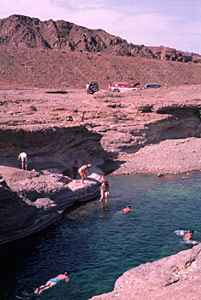
No day of rough riding in Dubai's desert would be complete without a dip in the pristine rock pools that have been sustaining the local nomads for centuries. Once considered a closely guarded secret, the location of these heavenly-blue pools is now marked on brochures catering to a new genre of guest: tourists.
With a booming economy, modern facilities and nearly no crime, Dubai and the rest of the United Arab Emirates offer poolside pampering, water sports, sunny water, plus something few other holiday hotspots can serve to the international jet-set: desert.
"For many tourists, particularly Asians, the desert is magical," says Gilbert, my guide during a night visit to the desert, when the moon sweeps the sands and the city lights are lost in the distant. He waves a hand and invites my appreciation of the vast emptiness. "We sometimes have problems. They book a tour for a day in the desert and when we get here, they don't want to leave.
"The Japanese are mesmerized. They beg me to leave them here. To just let them lay on the sand, and sleep in this magical place."
Of course, the reverence is difficult to comprehend when your lunch keeps bungi jumping between your stomach and throat as Ahmed swerves full throttle along the dry riverbeds that pass for highways across the UAE deserts. Called Wadis, the ancient creeks and rivers have run dry, but the rock bedding provides solid footing for a steady stream of four-wheel drive vehicles.
The Cannonball Runs along these riverbeds is known as Wadi Bashing, and it's more than a sport. Almost a national obsession.
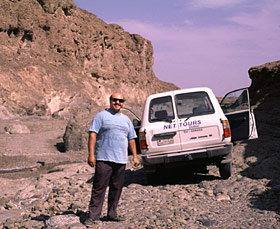 We left Dubai early on what Ahmed calls the deluxe tour. He delivers an
extensive program of sightseeing, zig-zagging through most of the Emirates and
both coasts of the jutting UAE peninsula, and touching upon thousands of years
of history in a trading Mecca that has served India, Asia and Africa, as well as
the Arab world.
We left Dubai early on what Ahmed calls the deluxe tour. He delivers an
extensive program of sightseeing, zig-zagging through most of the Emirates and
both coasts of the jutting UAE peninsula, and touching upon thousands of years
of history in a trading Mecca that has served India, Asia and Africa, as well as
the Arab world.
Dunes and camels can be seen on the road to the rock pools of Hatta, one of the region's most popular tourist destinations. The road continues north to Nasla, where the remnants of a 100-year-old jail remain. There are many mountain villages around Munai, which is reputed to produce the finest tobacco in the UAE.
Keep an eye open for small roadside markets. Besides bargains on pottery, cloth and woven rugs, the markets are like miniature Middle Eastern bazaars. Fruit is piled high - Dubai produces decent mangos, and there are baskets of red and green Indian chilies, herbs, tea and spices from Asia, and cakes and sweets from throughout the Arab realm.
This is people-watching paradise, although it's rude to stare or snap photos of the desert women, who remain hidden from head to toe in their black Bedouin wraps. The men wear white robes topped with the desert headdress. The markets will also be a meeting place for people from Lebanon, Egypt, Pakistan, Morocco, India and Palestine.
Bazaars are an Arab way of life. Dubai's famous markets include the gold souk, an entire neighborhood of shops selling the precious metal by weight, with a minimal charge for workmanship.
And world travelers have been delighting in Dubai's airport shopping center, offering electronics, perfume and jewelry in what is reportedly the largest duty free market on the planet.
Dubai has a marvelous old fish market, teeming with activity and sea smells. Nearby is the region's largest camel market, replete with musky reminders of the ancient depths of the desert.
Across to the Gulf of Oman, we reach the center of the Emirate of Fujairah, then drive north along a modern coastal highway that yields views reminiscent of Oregon, rugged rocks in one section, than small coves that offer access to intimate little beaches.
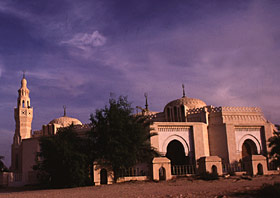 North of Murbah, still along the Gulf of Oman, is Khor Fakhan, site of the
oldest mosque in all the Emirates. Reportedly eight centuries old, the tiny
white mosque sits underneath an old fort.
North of Murbah, still along the Gulf of Oman, is Khor Fakhan, site of the
oldest mosque in all the Emirates. Reportedly eight centuries old, the tiny
white mosque sits underneath an old fort.
Continuing north, we come to the small city of Dibba. Buildings are packed tight together, and children scuffle in the streets while robed women keep a watch from the arched doorways. Dibba has a picturesque harbor, where small boats bob behind a rock breaker. The fish market is at the harbor, but the catch rarely reaches as far as the stalls. Crowds gather to peer into the nets and the bartering begins straight away.
Returning to Dubai, we pass through the arid settlements of Masafi and Dhaid. The greenery is striking in the midst of the bleak desert, but more startling is the lushness of the farmland. There are trees among the shrubs, even rows of flowers for the produce markets.
Crossing the peninsula means passing through parts of several Emerites and, briefly, the nation of Oman - all in the space of an hour. Formed a quarter of a century ago, the UAE is a crazy quilt of boundaries that could drive a mapmaker mad.
Dubai itself is an amazing example of modernization. Camels grazed for ages along Dubai Creek, where wooden boats transported the treasures of the Arab world to trade for silk and spices from Asia, jade jewelry from Africa, and manufactured goods from faraway Europe. The creek is still an important source of commerce, but most shipping has been switched to a pair of new ports, where Dubai has constructed the world's largest dry-docks.
Nowadays, skyscrapers rub shoulders with modern mosques on both sides of the creek, connected by a series of bridges and tunnels. The bustling street markets on both sides of the creek can also be reached by wooden boats, a constant flow of cheap ferries.
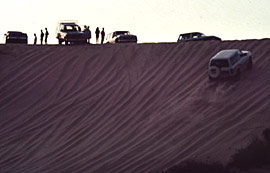 Oil wealth has brought Dubai not only
modern
architecture and
infrastructure, but also international hotels and all that come with them. The
nightclubs and discos - not to mention the only ice skating rinks in all of the
Middle East - might seem out of place in the Arab world. However, Dubai has
always had a liberal manner.
Oil wealth has brought Dubai not only
modern
architecture and
infrastructure, but also international hotels and all that come with them. The
nightclubs and discos - not to mention the only ice skating rinks in all of the
Middle East - might seem out of place in the Arab world. However, Dubai has
always had a liberal manner.
This accommodating attitude makes Dubai a genuine tourist option. Although access to the Emirates has been difficult for foreigners, the region is opening up to outsiders, as evidenced by the decision to create the Dubai Commerce and Tourism Promotion Board in 1989. There are now seven offices around the world.
International hotels include the Sheraton, Hyatt and Hilton, with a Marriott set to open this year. All the international hotels will book trips into the desert, including barbecue parties complete with native entertainment in desert tents. Also popular are water sports, which run the gamut from water-skiing and scuba, to parasail and jet skis.
Ron Gluckman is an American reporter based in Hong Kong, who visited Dubai in 1992 for a variety of stories including this travel piece, which ran in various American Express magazines.
To return to the opening page and index
push here
[right.htm]
